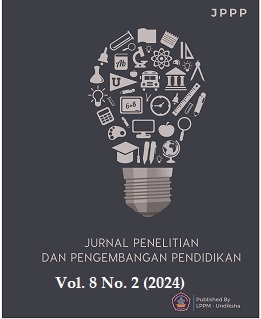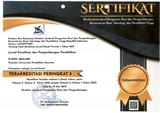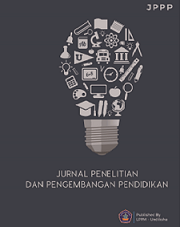Koditako Media (Digital Comics of Economic Activities) in IPAS for Fourth-Grade Students
DOI:
https://doi.org/10.23887/jppp.v8i2.76836Keywords:
Development, Media, Digital Comics, Economic ActivitiesAbstract
The use of learning media that is less varied and exciting results in students being less interested in learning, resulting in low student learning outcomes. This research aims to analyze the development, feasibility and effectiveness of Koditako media in improving student learning outcomes in the economic activities material in the science and science subject. This research is Research and Development (RnD), which refers to the ADDIE model. The subjects of this research consisted of material experts, material experts, language experts, class IV teachers and class IV students totalling 19 students. Data was collected by conducting observations, interviews, questionnaires and tests. Data analysis uses qualitative and quantitative descriptive analysis. The results of expert validation tests and teacher and student responses obtained very appropriate criteria. The T-test indicated a significant difference between the pretest and post-test average scores. The N-Gain test with moderate criteria shows increased student learning outcomes after using Koditako media. It was concluded that Koditako media is feasible and effective in improving learning outcomes for "IPAS" material on economic activities. The implication of this research is to make it easier for students to understand science learning material about economic activities so that student learning outcomes can improve.
References
Abdulrahaman, M. D., Faruk, N., Oloyede, A. A., Surajudeen-Bakinde, N. T., Olawoyin, L. A., Mejabi, O. V., Imam-Fulani, Y. O., Fahm, A. O., & Azeez, A. L. (2020). Multimedia tools in the teaching and learning processes: A systematic review. Heliyon, 6(11), e05312. https://doi.org/10.1016/j.heliyon.2020.e05312. DOI: https://doi.org/10.1016/j.heliyon.2020.e05312
Adomako, S., Amankwah-Amoah, J., Danso, A., Danquah, J. K., Hussain, Z., & Khan, Z. (2021). R&D intensity, knowledge creation process and new product performance: The mediating role of international R&D teams. Journal of Business Research, 128, 719–727. https://doi.org/10.1016/j.jbusres.2019.08.036. DOI: https://doi.org/10.1016/j.jbusres.2019.08.036
Aji, K. A. (2023). Literature Review: The Relationship between Merdeka Curriculum and Student Learning Achievement. Jurnal Pendidikan Jasmani (JPJ), 4(1), 17–30. https://doi.org/10.55081/jpj.v4i1.732. DOI: https://doi.org/10.55081/jpj.v4i1.732
Alenezi, A. (2020). The role of e-learning materials in enhancing teaching and learning behaviors. International Journal of Information and Education Technology, 10(1), 48–56. https://doi.org/10.18178/ijiet.2020.10.1.1338. DOI: https://doi.org/10.18178/ijiet.2020.10.1.1338
Alexander, K. (2020). The eco-humanities as a way of coordinating the natural and the human being. Ecopoiesis: Eco-Human Theory and Practice, 1(1), 6–16.
Andriyani, F., & Kusmariyatni, N. N. (2019). Pengaruh Media Komik Berwarna terhadap Hasil Belajar IPA Siswa. Jurnal Pedagogi Dan Pembelajaran, 2(3), 341. https://doi.org/10.23887/jp2.v2i3.19282. DOI: https://doi.org/10.23887/jp2.v2i3.19282
Aprilla, C. R. (2020). Pengembangan Media Pembelajaran Matematika Berbasis Komik untuk Meningkatkan Keterampilan Pemecahan Masalah Siswa. Thinking Skills and Creativity Journal, 3(2), 52–62. https://doi.org/10.23887/tscj.v3i2.30042. DOI: https://doi.org/10.23887/tscj.v3i2.30042
Beerkens, M. (2018). Evidence-based policy and higher education quality assurance: progress, pitfalls and promise. European Journal of Higher Education, 8(3), 272–287. https://doi.org/10.1080/21568235.2018.1475248. DOI: https://doi.org/10.1080/21568235.2018.1475248
Budiharso, T., & Tarman, B. (2020). Improving quality education through better working conditions of academic institutes. Journal of Ethnic and Cultural Studies, 7(1), 99–115. https://doi.org/10.29333/ejecs/306. DOI: https://doi.org/10.29333/ejecs/306
Budiyono, B. (2020). Inovasi Pemanfaatan Teknologi sebagai Media Pembelajaran di Era Revolusi 4.0. Jurnal Kependidikan: Jurnal Hasil Penelitian Dan Kajian Kepustakaan Di Bidang Pendidikan, Pengajaran Dan Pembelajaran, 6(2), 300–309. https://doi.org/10.33394/jk.v6i2.2475. DOI: https://doi.org/10.33394/jk.v6i2.2475
Candrayani, N. M. W., & Sujana, I. W. (2023). Digital Comics: Character Value-Based Learning Media in the Ramayana Puppet Story Content Social Studies Elementary School. Indonesian Values and Character Education Journal, 6(1), 63–72. https://doi.org/10.23887/ivcej.v6i1.54657. DOI: https://doi.org/10.23887/ivcej.v6i1.54657
Daniel T. Willingham. (2021). Why Don’t Students Like School?: A Cognitive Scientist Answers. 4–13.
Darmayanti, R., Sugianto, R., Baiduri, B., Choirudin, C., & Wawan, W. (2022). Digital comic learning media based on character values on students’ critical thinking in solving mathematical problems in terms of learning styles. Al-Jabar : Jurnal Pendidikan Matematika, 13(1), 49–66. https://doi.org/10.24042/ajpm.v13i1.11680. DOI: https://doi.org/10.24042/ajpm.v13i1.11680
Dessiane, S. T., & Hardjono, N. (2020). Efektivitas Media Pembelajaran Cerita Bergambar atau Komik Bagi Siswa Sekolah Dasar. Jurnal Pendidikan Dan Konseling, 2(1), 42–46. https://doi.org/https://doi.org/10.31004/jpdk.v2i1.537. DOI: https://doi.org/10.31004/jpdk.v1i2.537
Farsa, H., Johari, A., & Kamid. (2022). Pengembangan E-Modul Berbasis Komik dilengkapi Video Faktual pada Pelajaran IPA SMP Kelas VII. BIODIK: Jurnal Ilmiah Pendidikan Biologi, 8(2), 22–30. https://doi.org/https://doi.org/10.22437/bio.v8i2.16613. DOI: https://doi.org/10.22437/bio.v8i2.16613
Febriyandani, R., & Kowiyah, K. (2021). Pengembangan Media Komik dalam Pembelajaran Matematika Materi Pecahan Kelas IV Sekolah Dasar. Jurnal Pedagogi Dan Pembelajaran, 4(2), 323. https://doi.org/10.23887/jp2.v4i2.37447. DOI: https://doi.org/10.23887/jp2.v4i2.37447
Ferania, M., & Wardani, K. W. (2022). Pengembangan Media KOMPAS (Komik IPA SD) pada Materi Perubahan Wujud Benda Untuk Meningkatkan Minat Belajar Siswa Kelas 3 Sekolah Dasar. Jurnal Ilmiah Wahana Pendidikan, 8(22), 489–499.
Gede, I., Juni Pratama, D., Dantes, N., & Yudiana, K. (2020). Thematic Learning Plan With A Nature Of Science Learning Model In The Fourth Grade Of Elementary School. International Journal of Elementary Education, 4(4), 447–453. https://ejournal.undiksha.ac.id/index.php/IJEE.
Haryanto, H., Kartono, & Pranata, R. (2023). Pengembangan Media Komik Digital pada Materi Siklus Air untuk Meningkatkan Hasil Belajar Siswa Kelas V SD Negeri 5 Pontianak Timur. Fondatia, 7(2), 331–339. https://doi.org/10.36088/fondatia.v7i2.3412. DOI: https://doi.org/10.36088/fondatia.v7i2.3412
Hasanah, U., Astra, I. M., & Sumantri, M. S. (2023). Exploring the Need for Using Science Learning Multimedia to Improve Critical Thinking Elementary School Students: Teacher Perception. International Journal of Instruction, 16(1), 417–440. https://doi.org/10.29333/iji.2023.16123a. DOI: https://doi.org/10.29333/iji.2023.16123a
Hutasuhut, A. R., & Armanto, D. (2022). Meta Analysis of Mathematical Learning Participants According to Piaget Theory. Jurnal Ilmiah Wahana Pendidikan, 8(24), 150–159.
Inayah, I. S. (2023). Peran Media Pembelajaran “Papan Pintar” pada Mata Pelajaran IPA di Sekolah Dasar. Pendas : Jurnal Ilmiah Pendidikan Dasar, 8(2), 2923–2936. DOI: https://doi.org/10.23969/jp.v8i1.8049
Juneli, J. A., Sujana, A., & Julia, J. (2022a). Pengembangan Media Pembelajaran Komik Digital pada Penguasaan Konsep Peserta Didik SD Kelas V. Primary: Jurnal Pendidikan Guru Sekolah Dasar, 11(4), 1093–1102. https://doi.org/10.33578/jpfkip.v11i4.9070.
Juneli, J. A., Sujana, A., & Julia, J. (2022b). Pengembangan Media Pembelajaran Komik Digital Pada Penguasaan Konsep Peserta Didik Sd Kelas V. Primary: Jurnal Pendidikan Guru Sekolah Dasar, 11(4), 1093–1102. https://doi.org/10.33578/jpfkip.v11i4.9070. DOI: https://doi.org/10.33578/jpfkip.v11i4.9070
Kharimah, I., Jekan Raya, K., Palangka Raya, K., & Tengah, K. (2023). The Implementation Of Merdeka Curriculum For Formal English Learning. Atmosfer: Jurnal Pendidikan, Bahasa, Sastra, Seni, Budaya, Dan Sosial Humaniora, 1(3), 52–65. https://doi.org/10.59024/atmosfer.v1i3.206. DOI: https://doi.org/10.59024/atmosfer.v1i3.206
Kopnina, H. (2020). Education for the future? Critical evaluation of education for sustainable development goals. Journal of Environmental Education, 51(4), 280–291. https://doi.org/10.1080/00958964.2019.1710444. DOI: https://doi.org/10.1080/00958964.2019.1710444
Marwa, M., Munirah, M., Angriani, A. D., Suharti, S., Sriyanti, A., & Rosdiana, R. (2020). Peran Guru dalam Meningkatkan Minat Belajar Peserta Didik Kelas IV pada Masa Pandemi Covid-19. AULADUNA: Jurnal Pendidikan Dasar Islam, 7(2), 215. https://doi.org/10.24252/10.24252/auladuna.v7i2a10.2020. DOI: https://doi.org/10.24252/10.24252/auladuna.v7i2a10.2020
Mirosunnaily, S., & Pramudiani, P. (2021). The Influence of Digital Comic Learning Media on Primary School Students’ Motivation in Social Studies. DWIJA CENDEKIA: Jurnal Riset Pedagogik, 5(1), 151. https://doi.org/10.20961/jdc.v5i1.53220. DOI: https://doi.org/10.20961/jdc.v5i1.53220
Mulia, Y. A., & Kristin, F. (2023). Pengembangan Media Pembelajaran Komik Digital untuk Meningkatkan Motivasi dan Hasil Belajar IPS Siswa Kelas 4 SD. Journal on Teacher Education, 4(4), 293–302. https://doi.org/https://doi.org/10.31004/jote.v4i4.15106.
Nababan, Z. A. H., Arisanty, D., Mutiani, Mattiro, S., & Nasrullah. (2021). Human, Space, and Environment: Literature Review Through Exploring the Theme in Social Studies. Proceedings of the 2nd International Conference on Social Sciences Education (ICSSE 2020), 525(Icsse 2020), 163–166. https://doi.org/10.2991/assehr.k.210222.024. DOI: https://doi.org/10.2991/assehr.k.210222.024
Narestuti, A. S., Sudiarti, D., & Nurjanah, U. (2021). Penerapan Media Pembelajaran Komik Digital untuk Meningkatkan Hasil Belajar Siswa Application. Bioedusiana: Jurnal Pendidikan Biologi, 6(20), 305–317. https://doi.org/https://doi.org/10.37058/bioed.v6i2.3756. DOI: https://doi.org/10.37058/bioed.v6i2.3756
Pamungkas, W. A. D., & Koeswanti, H. D. (2022). Penggunaan Media Pembelajaran Video Terhadap Hasil Belajar Siswa Sekolah Dasar. Jurnal Ilmiah Pendidikan Profesi Guru, 4(3), 346–354. https://doi.org/10.23887/jippg.v4i3.41223. DOI: https://doi.org/10.23887/jippg.v4i3.41223
Paramita, G. A. P. P., Gede Agung, A. A., & Abadi, I. B. G. S. (2022). Buku Cerita Bergambar Guna Meningkatkan Keterampilan Membaca Muatan Pelajaran Bahasa Indonesia Siswa Kelas III SD. Mimbar Ilmu, 27(1), 11–19. https://doi.org/10.23887/mi.v27i1.45499. DOI: https://doi.org/10.23887/mi.v27i1.45499
Prasetya, S. P., Segara, N. B., & Imron, A. (2020). Effectiveness Of Outdoor Learning Optimization Program In Learning Social Studies. JPI (Jurnal Pendidikan Indonesia), 9(2), 314. https://doi.org/10.23887/jpi-undiksha.v9i2.19160. DOI: https://doi.org/10.23887/jpi-undiksha.v9i2.19160
Pristiwanti, D., Badariah, B., Hidayat, S., & Dewi, R. S. (2022). Pengertian Pendidikan. Jurnal Pendidikan Dan Konseling, 4(6), 1349–1358.
Priyangga, B., Sarwi, S., & Widiyatmoko, A. (2022). Implementation of E-Comics to Grow Environmental Literacy using Outdoor Learning Methods in the New Normal Time. Eduvest - Journal of Universal Studies, 2(9), 1917–1930. https://doi.org/10.59188/eduvest.v2i9.584. DOI: https://doi.org/10.59188/eduvest.v2i9.584
Puspitasari, W. D., & Rodiyana, R. (2022). Comic Media in Learning of Elementary Schools: Systematic Literature Review. Journal of Innovation and Research in Primary Education, 1(1), 12–17. https://doi.org/10.56916/jirpe.v1i1.29. DOI: https://doi.org/10.56916/jirpe.v1i1.29
Putra, A., & Milenia, I. F. (2021). Systematic Literature Review: Media Komik dalam Pembelajaran Matematika. Mathema: Jurnal Pendidikan Matematika, 3(1), 30–43. https://doi.org/10.33365/jm.v3i1.951. DOI: https://doi.org/10.33365/jm.v3i1.951
Qureshi, M. I., Khan, N., Raza, H., Imran, A., & Ismail, F. (2021). Digital Technologies in Education 4.0. Does it Enhance the Effectiveness of Learning? International Journal of Interactive Mobile Technologies, 15(4), 31–47. https://doi.org/10.3991/IJIM.V15I04.20291. DOI: https://doi.org/10.3991/ijim.v15i04.20291
Rachmavita, F. P. (2020). Interactive media-based video animation and student learning motivation in mathematics. Journal of Physics: Conference Series, 1663(1). https://doi.org/10.1088/1742-6596/1663/1/012040. DOI: https://doi.org/10.1088/1742-6596/1663/1/012040
Radeswandri, Vebrianto, R., & Thahir, M. (2021). Evaluation on the Use of Online Comics among Students: Development Studies at Universitas Terbuka. JTP - Jurnal Teknologi Pendidikan, 23(1), 37–48. https://doi.org/10.21009/jtp.v23i1.19084. DOI: https://doi.org/10.21009/jtp.v23i1.19084
Rahayu, A., Prasetyo, A. T., & Utomo, C. B. (2023). Pengembangan Komik Digital Berbasis CTL untuk Pemahaman Konsep IPA dan Motivasi Belajar Siswa Sekolah Dasar. Jurnal Inovasi Pendidikan Dan Pembelajaran Sekolah Dasar, 7(1), 89–102. https://doi.org/https://doi.org/10.24036/jippsd.v7i1.122234. DOI: https://doi.org/10.24036/jippsd.v7i1.122234
Rahayu, R., Rosita, R., Rahayuningsih, Y. S., Hernawan, A. H., & Prihantini, P. (2022). Implementasi Kurikulum Merdeka Belajar di Sekolah Penggerak. Jurnal Basicedu, 6(4), 6313–6319. https://doi.org/10.31004/basicedu.v6i4.3237. DOI: https://doi.org/10.31004/basicedu.v6i4.3237
Rahayu, Y. (2023). Problematika Kurikulum di Sekolah Dasar. Pendas : Jurnal Ilmiah Pendidikan Dasar, 8(1), 3176–3187. https://doi.org/10.23969/jp.v8i1.8594. DOI: https://doi.org/10.23969/jp.v8i1.8594
Rahmatullah, R., Inanna, I., Rakib, M., Mustari, M., & Rabania, R. (2020). Developing Tematic Economic Comic with Characters for Early Childhood. Journal of Educational Science and Technology (EST), 6(3), 293–300. https://doi.org/10.26858/est.v6i3.14949. DOI: https://doi.org/10.26858/est.v6i3.14949
Rahmi, N., Putra, M. J. A., & Alim, J. A. (2022). Pengembangan Media Komik Digital Pada Pembelajaran Pelestarian Lingkungan Kelas V Tema VIII di Sekolah Dasar. Primary: Jurnal Pendidikan Guru Sekolah Dasar, 11(6), 1712–1725. https://doi.org/http://dx.doi.org/10.33578/jpfkip.v11i6.8615. DOI: https://doi.org/10.33578/jpfkip.v11i6.8615
Rina, N., Suminar, J. R., Damayani, N. A., & Hafiar, H. (2020). Character education based on digital comic media. International Journal of Interactive Mobile Technologies, 14(3), 107–127. https://doi.org/10.3991/ijim.v14i03.12111. DOI: https://doi.org/10.3991/ijim.v14i03.12111
Rusmaini, R. (2023). Use Of Comic-Based Learning Media In Economics Subject. Jurnal Ilmiah Profesi Pendidikan, 8(2), 1232–1238. https://doi.org/10.29303/jipp.v8i2.1467. DOI: https://doi.org/10.29303/jipp.v8i2.1467
Sanjayanti, N. P. A. ., Darmayanti, N. . S., D. Qondias, & Sanjaya, K. (2020). Integrasi Keterampilan 4C Dalam Modul Metodologi Penelitian. Jurnal Pedagogi Dan Pembelajaran, 3(3), 407–415. https://doi.org/10.23887/jp2.v3i3.28927.
Sartini, & Mulyono, R. (2022). Analisis Implementasi Kurikulum Merdeka Belajar untuk Mempersiapkan Pembelajaran Abad 21. Didaktik : Jurnal Ilmiah PGSD STKIP Subang, 8(2), 1348–1363. https://doi.org/10.36989/didaktik.v8i2.392. DOI: https://doi.org/10.36989/didaktik.v8i2.392
Schlander, M., Hernandez-Villafuerte, K., Cheng, C. Y., Mestre-Ferrandiz, J., & Baumann, M. (2021). How Much Does It Cost to Research and Develop a New Drug? A Systematic Review and Assessment. PharmacoEconomics, 39(11), 1243–1269. https://doi.org/10.1007/s40273-021-01065-y. DOI: https://doi.org/10.1007/s40273-021-01065-y
Sebayang, K. B., Hasruddin, H., & Milfayetty, S. (2023). Developing Life Skills with Digital Comic Books to Improve Students’ Critical Thinking Abilities in Science Subject. Randwick International of Education and Linguistics Science Journal, 4(4), 1013–1023. https://doi.org/10.47175/rielsj.v4i4.864. DOI: https://doi.org/10.47175/rielsj.v4i4.864
Senen, A., Sari, Y. P., Herwin, H., Rasimin, R., & Dahalan, S. C. (2021). The use of photo comics media: Changing reading interest and learning outcomes in elementary social studies subjects. Cypriot Journal of Educational Sciences, 16(5), 2300–2312. https://doi.org/10.18844/cjes.v16i5.6337. DOI: https://doi.org/10.18844/cjes.v16i5.6337
Shaturaev, J. (2021a). 2045: Path to nation’s golden age (Indonesia Policies and Management of Education). “Science and Education” Scientific Journal, 2(12), 866–875. https://orcid.org/0000-0003-3859-2526.
Shaturaev, J. (2021b). Indonesia: Superior Policies and Management for Better Education (Community development through Education). Архив Научных Исследований, 1(1), 1–10. https://www.researchgate.net/publication/357271101.
Sudarmono, Hasibuan, L., & Anwar, K. (2021). Pembiayaan Pendidikan. Jurnal Manajemen Pendidikan Dan Ilmu Sosial, 2(1), 266–280. https://doi.org/https://doi.org/10.38035/jmpis.v2i1.448. DOI: https://doi.org/10.38035/jmpis.v2i1.448
Suharti, S., Rusmawati, R. D., & Nurjati, N. (2023). Pengembangan Komik Digital Huruf Jawa pada Mata Pelajaran Bahasa Jawa Kelas VII di SMP Negeri 29 Surabaya. Tafhim Al-’Ilmi, 14(1), 154–179. https://doi.org/10.37459/tafhim.v14i1.6036. DOI: https://doi.org/10.37459/tafhim.v14i1.6036
Suhelayanti, Syamsiah, Z., Rahmawati, I., Tantu, Y. R. P., Kunusa, Wiwin Rewini Suleman, N., Nasbey, H., Tangio, J. S., & Anzelina, D. (2023). Pembelajaran Ilmu Pengetahuan Alam dan Sosial IPAS. Yayasan Kita Menulis.
Supartayasa, I. K. R., & Wibawa, I. M. C. (2022). Belajar Siklus Air dengan Media Komik Digital Berbasis Tri Hita Karana. 5(1), 127–137. https://doi.org/https://doi.org/10.23887/jp2.v5i1.46279. DOI: https://doi.org/10.23887/jp2.v5i1.46279
Suryana, D., Yulia, R., & Safrizal, S. (2021). Content Analysis of Al-Qur’an Science Integration in Children’S Animated Serial of Riko the Series on Hujan’S Episode. Ta’dib, 24(1), 93. https://doi.org/10.31958/jt.v24i1.2808. DOI: https://doi.org/10.31958/jt.v24i1.2808
Udiani, N. K. I., & Kristiantari, M. . R. (2021). Video Pembelajaran Pengenalan Lambang Bilangan Berbasis Teori Brunner untuk Anak Usia Dini. Jurnal Pendidikan Anak Usia Dini Undiksha, 9(2), 202–210. https://doi.org/10.23887/paud.v9i1.34445. DOI: https://doi.org/10.23887/paud.v9i1.34445
Umairoh, S. H., & Amaliyah, N. (2022). Educational Comic-Based Digital Media to Increase Reading Interest of Elementary School Students. Jurnal Ilmiah Pendidikan Profesi Guru, 5(2), 300–311. https://doi.org/10.23887/jippg.v5i2.50378. DOI: https://doi.org/10.23887/jippg.v5i2.50378
Umami, D. A. (2019). Hubungan Media Pembelajaran Dan Minat terhadap Motivasi Mahasiswi Tingkat III Kebidanan Widya Karsa Jayakarta. Journal Of Midwifery, 7(1), 6–16. https://doi.org/10.37676/jm.v7i1.766. DOI: https://doi.org/10.37676/jm.v7i1.766
Wahyuningtyas, R., & Sulasmo, B. S. (2020). Pentingnya Media Pembelajaran dalam Meningkatkan Hasil Belajar di Sekolah Dasar. EDUKATIF: Jurnal Ilmu Pendidikan, 2(1), 23–27. https://doi.org/10.52217/lentera.v16i1.1081. DOI: https://doi.org/10.31004/edukatif.v2i1.77
Westbroek, J., Nijhuis, H., & van der Maesen, L. (2020). Evolutionary Thermodynamics and Theory of Social Quality as Links between Physics, Biology, and the Human Sciences. The International Journal of Social Quality, 10(1), 57–86. https://doi.org/10.3167/ijsq.2020.100104. DOI: https://doi.org/10.3167/IJSQ.2020.100104
Wibowo, S. A., & Koeswanti, H. D. (2021). Pengembangan Media Pembelajaran Berbasis Komik untuk Meningkatkan Karakter Kemandirian Belajar Siswa Sekolah Dasar. Jurnal Basicedu, 5(6), 5100–5111. https://doi.org/https://doi.org/10.31004/basicedu.v5i6.1600. DOI: https://doi.org/10.31004/basicedu.v5i6.1600
Wicaksono, J. W., Japar, M., & Utomo, E. (2021). Development of Digital Based Comic Media for Primary V-Class Student Learning. International Journal of Multicultural and Multireligious Understanding, 8(4), 532. https://doi.org/10.18415/ijmmu.v8i4.2601. DOI: https://doi.org/10.18415/ijmmu.v8i4.2601
Winarni, E. W., Hambali, D., & Purwandari, E. P. (2020). Analysis of language and scientific literacy skills for 4th grade elementary school students through discovery learning and ict media. International Journal of Instruction, 13(2), 213–222. https://doi.org/10.29333/iji.2020.13215a. DOI: https://doi.org/10.29333/iji.2020.13215a
Wiradarma, K., Suarni, N., & Renda, N. (2021). Analisis Hubungan Minat Belajar terhadap Hasil Belajar Daring IPA Siswa Kelas III Sekolah Dasar. MIMBAR PGSD Undiksha, 9(3), 408–415. https://doi.org/10.23887/jjpgsd.v9i3.39212. DOI: https://doi.org/10.23887/jjpgsd.v9i3.39212
Wuarlela, M. (2020). Variasi Metode dan Media Pembelajaran Daring untuk Mengakomodasi Modalitas Belajar. ARBITRER: Jurnal Pendidikan Bahasa Dan Sastra Indonesia, 2(2), 261–272. https://doi.org/10.30598/arbitrervol2no2hlm261-272. DOI: https://doi.org/10.30598/arbitrervol2no2hlm261-272
Wulansari, D., Johari, A., & Asra, R. (2022). Pengembangan Media Komik Digital Berbasis Faktual pada Materi Pencemaran Lingkungan untuk Siswa Kelas X SMA. BIODIK: Jurnal Ilmiah Pendidikan Biologi, 8(1), 42–50. https://doi.org/https://doi.org/10.22437/bio.v8i1.15713. DOI: https://doi.org/10.22437/bio.v8i1.15713
Zakiyah, Z., Arisandi, M., Oktora, S. D., Hidayat, A., Karlimah, K., & Saputra, E. R. (2022). Pengembangan Buku Teks Bahasa Indonesia Berbasis Media Komik Digital Bermuatan Keterampilan Berpikir Kritis. Jurnal Basicedu, 6(5), 8431–8440. https://doi.org/10.31004/basicedu.v6i5.3869. DOI: https://doi.org/10.31004/basicedu.v6i5.3869
Downloads
Published
How to Cite
Issue
Section
License
Copyright (c) 2024 Isma Alliyatuz Zulfa, Kurniana Bektiningsih

This work is licensed under a Creative Commons Attribution-ShareAlike 4.0 International License.
Authors who publish with the Jurnal Penelitian dan Pengembangan Pendidikan agree to the following terms:
- Authors retain copyright and grant the journal the right of first publication with the work simultaneously licensed under a Creative Commons Attribution License (CC BY-SA 4.0) that allows others to share the work with an acknowledgment of the work's authorship and initial publication in this journal.
- Authors are able to enter into separate, additional contractual arrangements for the non-exclusive distribution of the journal's published version of the work (e.g., post it to an institutional repository or publish it in a book), with an acknowledgment of its initial publication in this journal.
- Authors are permitted and encouraged to post their work online (e.g., in institutional repositories or on their website) prior to and during the submission process, as it can lead to productive exchanges, as well as earlier and greater citation of published work. (See The Effect of Open Access)








